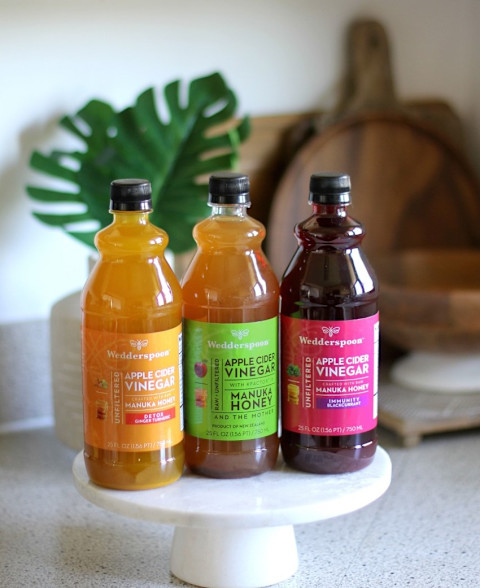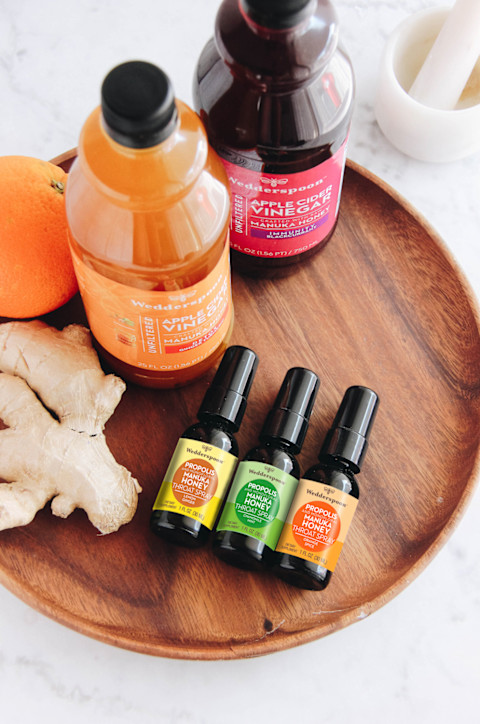Shopping for Apple Cider Vinegar? Here's What An RD Wants You To Know

With all due respect to pumpkin spice, we're team apple cider everything come fall: warm apple cider, apple cider doughnuts (all about balance here), and, of course, a renewed appreciation for the funky, tart health food favorite that is apple cider vinegar. And the latter is right on time for the onslaught of colds, flu, and immunity challenges that the season brings.
We've now got more ACV products and drinking vinegars on the market than ever before, so to help us make sense of it all, we caught up with expert and author Jessica Cording, M.S., R.D., CDN, to ask her everything she knows about apple cider vinegar. Below, a checklist to keep in mind when shopping for a bottle, how she knows it's the real deal, and her favorite way to drink up.
What to look for
1. Made with organic apples, raw, and with the mother. "I like to make sure it says these three things on the bottle," Cording explains. Organic is self-explanatory, but what about the last two?
Raw refers to how the apple cider vinegar is processed. "In an ideal world, you get the fermentation benefits that are a side effect of how apple cider vinegar is made," Cording says. Apple cider vinegars that have been pasteurized (a fancy word for heated or made with chemical processing) can lose some of the beneficial, gut-friendly nutrition that accompanies the live ingredients.
The "mother" is the part of the apple cider vinegar that looks a little, well, suspect. It sometimes looks stringy, murky, or like sediment that's collected at the bottom of the bottle—these are all good signs. Also known as mycoderma aceti, the mother is a group of microorganisms—the beneficial bacteria and enzymes—that converts alcohol to vinegar. Without it, there would be no ACV. That's why apple cider vinegar that contains the mother is the real deal.

Manuka honey company Wedderspoon's new line of apple cider vinegar concentrates checks all three of these boxes—with the added immunity support of high-quality New Zealand Manuka the brand is known for. One flavor in particular, the Immunity Black Currant Apple Cider Vinegar, provides a double hit of immunity (thanks to the vitamin C and Manuka honey), bumping it to the top of the cold season shopping list. And bonus: If you're not a fan of the traditional tangy taste of ACV, Wedderspoon's addition of earthy Manuka honey and seasonal fruits and spices has you covered.
2. A glass or BPA-free bottle. "I prefer glass, but when that's not an option, a shelf-stable BPA-free plastic bottle is best," says Cording. If you go with a plastic bottle, be sure not to leave it sitting in the sun or in the back of a hot car, and recycle it when you're through!
How to store it
Once you've purchased a winning bottle of ACV, you'll want to know whether it goes into the fridge or pantry. While Cording mentioned that most vinegars keep at room temperature, she likes to keep her ACV cool. "I store in the fridge so it stays as active as possible," she says. Noted!
How to drink it
1. Be sure to dilute it. "I always tell my apple-cider-vinegar-obsessed clients to dilute it if they're adding it to their rotation," says Cording. "That means no shots of apple cider vinegar." Consuming undiluted apple cider vinegar can irritate or burn the esophagus, which is antithetical to its purpose! Cording's favorite way to consume apple cider vinegar is by adding some to seltzer or regular water, but she also recommends adding it to recipes that call for an acidic ingredient, like salad dressings.
2. Add an immune booster. While Cording mentioned that adding whole fruits to ACV is her go-to, she recognizes it's not always possible for on-the-go nutrition. "Blackcurrant and raspberry are foods known to be high in antioxidants," she says, which are typically helpful in boosting immunity.

Propolis, a byproduct of honey-making, is another compound that's been studied1 for its anti-inflammatory, antimicrobial, and antifungal properties. Add propolis extract to your ACV concoction for an extra immunity boost! Wedderspoon's also makes a new bee Propolis and Manuka Honey Throat Spray in three flavors including Warming Orange Spice, Cooling Chamomile Mint, and Lemon Ginger, which helps coat and soothe the inner lining of your throat, perfect for whenever you feel a little something coming on.
If an apple a day keeps the doctor away, we can only imagine how beneficial a nutrient-packed, immune-boosting ACV must be for our health. Cheers!
